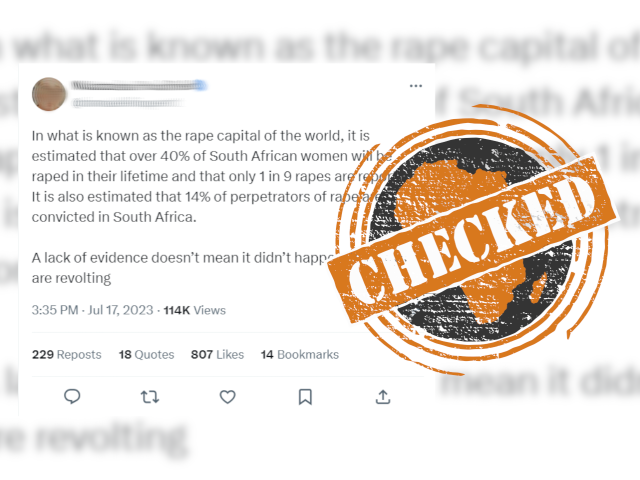COMMENT: South Africa's poverty and income statistics fall victim to Covid-19
Let’s talk about counting people and things – about surveys. “What?” I hear you ask. “Don’t we have more important things to worry about right now?”
With South Africa in Covid-19 lockdown for nearly four months and counting, and case numbers and deaths rising, what is so pressing about doing a survey right now? We’re not allowed to visit our family and friends – and let’s not even talk about those bans.
But give me a few minutes. This matters, I promise.
A recent article in the Business Day made me sit right up. It reported that Statistics South Africa, the country’s national statistical agency, has taken a budget hit.
Finance minister Tito Mboweni delivered his supplementary budget review speech in June, in which he announced changes to the February 2020 budget. The review was caused by the Covid-19 pandemic. In broad strokes, most departments have had their budgets reduced. Stats SA has lost R200 million.
Census 2021 too important to cut
What does this mean? Something at the data agency has to give.
Statistician-general Risenga Maluleke told members of parliament that they had considered what to place on the chopping board.
First up was shaving money from the already “underfunded” 2021 census. They decided against it: It’s too important. He’s right – the census produces essential demographic data. It is especially valuable when interrogating claims about the hot-button topic of migration.
Africa Check used census data to fact-check unsubstantiated claims about the number of foreign nationals living in Hillbrow, Johannesburg, at a time of great tension following xenophobia-linked attacks in 2019.
The census is also our go-to when verifying claims about progress, or lack thereof. We used it in 2013 to check a much-shared claim that the country had “ten times more people in squatter camps than in 1994”.
Another option, Maluleke said, was to spread the loss around and pinch funding from up to 11 different surveys. But this would mean important schedules of many regular data publications would be broken. They decided against this too.
Income expenditure survey hardest hit
A decision was then made to take R17 million from allocations to international standards and R33 million from the agency’s travel and subsistence budget. To make up the difference of R150 million, the axe came down hardest on what is known as the income and expenditure survey. The difficulty of conducting face-to-face interviews during a pandemic also contributed to the decision. In-person interviews are essential to the survey.
The survey collects data from around 25,000 households nationally on poverty, income, consumption and spending patterns. Scheduled for 2020 and 2021, it has now been put on hold.
The data from income and expenditure surveys has been integral to our work over the years. Issues of race, income and poverty are frequent political footballs in South Africa. Regular and reliable data helps ground these discussions in reality in a country where flashpoints are always quick to ignite.
The survey has, for example, allowed us to fact-check claims about the difference in household income between the races. It also helped us set the record straight on poverty levels in South Africa when the Mail Online, the much-read website of UK tabloid the Daily Mail, reported that 400,000 white people lived in poverty in South Africa. The survey showed it was actually around 42,000.
At a time when the pandemic is decimating both livelihoods and lives, data from this survey only becomes more vital.
Survey results influence crucial economic measures
The loss of the survey will also have a knock-on effect on other statistics. Its data would have been used to update the country’s poverty line statistics and the items included in the basket of goods used to determine the consumer price index, or CPI.
Why do these matter? Because the prices of goods and services consumed by South Africans are used to calculate an inflation rate for the whole economy, a key measure in any country.
The pandemic has placed enormous financial pressure on countries around the world. South Africa is no exception.
In parliament, statistician-general Maluleke said that he understood why funds had to be cut. “We have to choose to save lives here and now in the crisis, or say that we want to count people and institutions.”
But saving lives should also be viewed in terms of making the right policy decisions, informed by accurate numbers. Stats SA, and the data it produces, is invaluable to the country, its people and to attempts to solve numerous pressing challenges.
Accurate data essential to hold government to account
In addition to the obvious headache posed to proper planning, it will become harder for civil society and the broader public to hold their government accountable for promises made and broken.
And for fact-checkers and the media, it will be an uphill struggle to determine if public statements on important topics are true or false.
Sadly, we have been here before. In February 2020 BC (“before Covid”) the South African Statistics Council sent out a Mayday signal. They warned that the agency was at a financial “tipping point”. The R200 million budget cut will only compound this.
It need not be so. Official statistical agencies and the data they produce are an integral part of democracies. Their work should be prioritised and adequately funded.
Kate Wilkinson is the deputy chief editor at Africa Check.




Add new comment